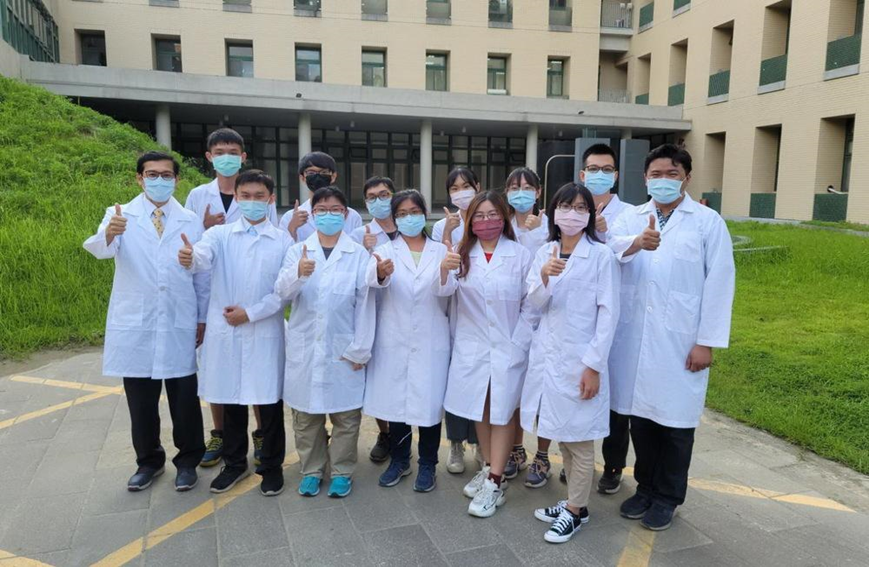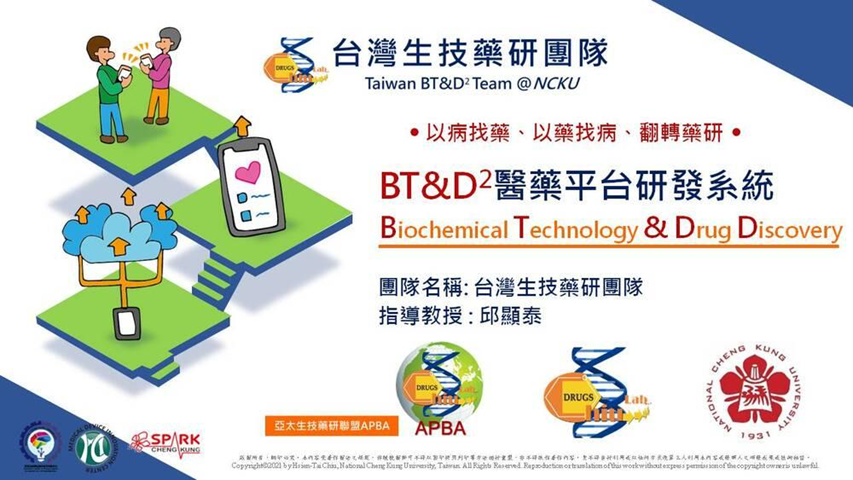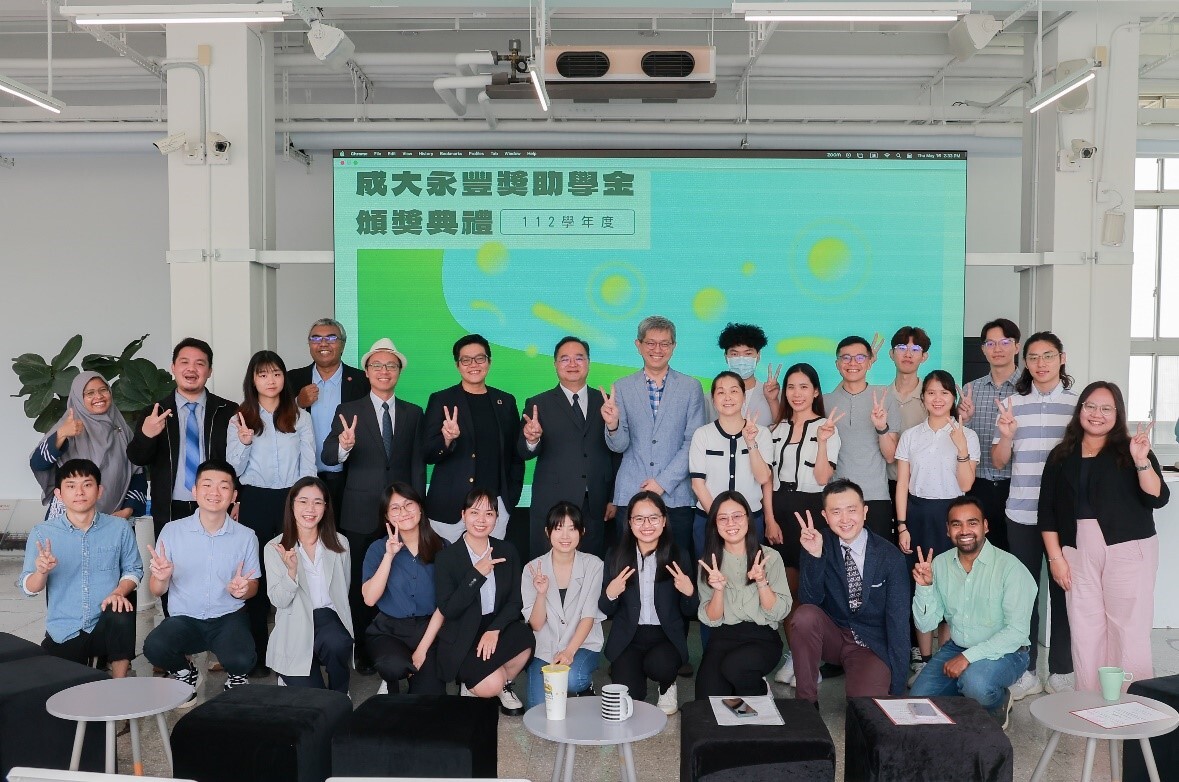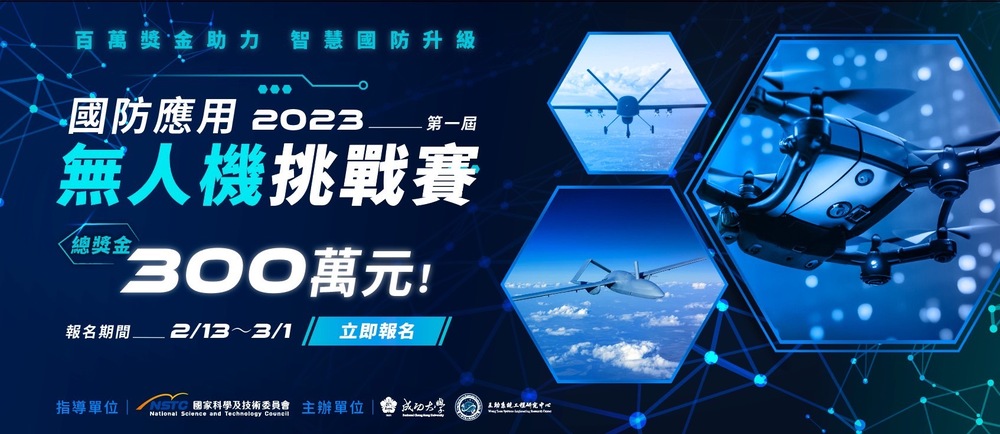SDG1
NCKU Taiwan BT&D² Team Led by Hsien-Tai Chiu Rolled out the System to Lower the Cost and Time of Medicine Development
NCKU Taiwan BT&D² Team Led by Hsien-Tai Chiu Rolled out the System to Lower the Cost and Time of Medicine Development
"Interdisciplinary and transnational collaboration is the key to our success.” Hsien-Tai Chiu, the associate professor of National Cheng Kung University (NCKU) Department of Chemistry, led the Taiwan BT&D² Team which united NCKU, National Tsing Hua University (NTHU), Kaohsiung Veterans General Hospital (KVGH) Tainan Branch, and other medical research units.The team developed the “Biochemical Technology and Drug Discovery (”BT&D² “), which is a system for medical research and development through artificial intelligence combining traditional Chinese medicine and modern medicine. Mr. Chiu pointed out that the system is able to decrease 90% of expenses during the medicine development; thus lower the cost and shorten the development time.
The influence of population aging signifies the importance of the prevention and treatment of chronic diseases. Even though scientists hold statistics, the development of a type of medicine takes approximately a decade, and the expenses are nearly 10 billion US dollars. Mr. Chu indicated that the medical analysis service is still insufficient in both Taiwan and other countries.
BT&D² overturns the traditional medical development methods. The system organized the data banks and used artificial intelligence to algorithmize and search out the proper medicine for the disease; in the meantime, the system could discover the disease that the medicine could treat. The function helped pairing the medicine and the disease up, and therefore optimized the prescription, information, and efficiency, which could significantly lower the time and the cost of the development.
Not only achieving the goals above, the system could also modify the medicine structure and optimize the prescription for both traditional and modern medicine. Therefore, precision medicine can be achieved. In terms of products for health and aesthetic medicine, the system is able to select edible medicinal materials and foods which contain drug effects, and can thus skip the lengthy clinical trials. The combination of therapy targets modern medicine and recuperation of traditional medicine,may lead to the complementary treatment.
Taiwan BT&D² Team has received plenty of awards, won third place in “Longterm Smile Contest”, and got first place among the drug discovery teams. In addition, the team also won the third place in the Contest on Innovation and Entrepreneurship of Biomedicine and New Agriculture held by the Ministry of Education in 2020; honorable mention in TMU BioMed Demo Day; the second place in the Contest on Interdisciplinary Talents of Biomedicine. From 2018 to 2020, the team had been selected to be in the SPARK program hosted by the Ministry of Science and Technology (MOST).
One of the team members, Hu Barry, pointed out that from laboratory, clinical trial, to market development, BT&D² owns the complete experiment structure; Moreover, the process of the experiments is paced and promising. Mr. Hu felt a sense of achievement from participating in the development of the system since NCKU was able to get in touch with other laboratories and corporate interdisciplinarily. It broadened his horizons and made him recognize that the immeasurable situation is waiting for him to discover.
Development and research of medicine is a research work that requires the participation of multidisciplinary fields. Mr. Chiu indicated that NCKU possesses outstanding interdisciplinary talents and resources. The team includes talent whose expertise is chemistry, biology, information engineering, medicine, technology management, etc. Besides, there are diverse resources for the team to collaborate transnationally. Shu-Han, Xu, one of the team members mentioned that the target of the BT&D², “Searching out the medicine from the illness; searching out the illness from the medicine.”, is to expect collaboration from cross-disciplinary fields. Additionally, the team wants to realize the real needs from the pharmaceutical plants, doctors, and patients through the partnership with pharmaceutical companies.
With the New Southbound Policy and the support from NCKU, Taiwan BT&D² Team connects University of Malaya (UM), Mahidol University (MU), University of Indonesia (UI), Korea University (KU), and other research institutions from Asian universities to establish Asia-Pacific Biotechnology Association (APBA). The association connects the research and development techniques and the resources. Through the collaboration, the members are able to cooperate with local biotech companies and corporations, and thus promote the results of the research to the international market. Therefore, the team can not only expand their research and development capacity, but also understand the requirements from industries.
APBA collaborates with institutions for academic research from Taiwan and foreign countries. The association sets Taiwan as the standpoint, Asia-Pacific as a relay station, and connects to the world. Mr. Chiu mentioned that it is impossible for a single laboratory to conduct experiments regarding various kinds of animals at the same time. APBA can be the platform for members to share research resources and results, and receive endemic pharmaceutical plants from different nations, which are beneficial to raise the diversity and develop efficiency of the medicine. It is fortunate that various Asia-Pacific top universities are willing to collaborate with NCKU and share resources efficiently.
The covid-19 pandemic influences the world negatively on economics and the development of research. Mr. Chiu pointed out that the pandemic turned the process of the research and development into a challenge, but the team solved the problem gradually. Taiwan BT&D² Team can operate through Big Data. With computers and the internet, the research can be continued, and the further experiment is processed under the collaboration among the institutions for academic research regardless of region. The Interdisciplinary and transnational collaboration enable Taiwan BT&D² Team to make full use of their advantages.
"Interdisciplinary and transnational collaboration is the key to our success.” Hsien-Tai Chiu, the associate professor of National Cheng Kung University (NCKU) Department of Chemistry, led the Taiwan BT&D² Team which united NCKU, National Tsing Hua University (NTHU), Kaohsiung Veterans General Hospital (KVGH) Tainan Branch, and other medical research units.The team developed the “Biochemical Technology and Drug Discovery (”BT&D² “), which is a system for medical research and development through artificial intelligence combining traditional Chinese medicine and modern medicine. Mr. Chiu pointed out that the system is able to decrease 90% of expenses during the medicine development; thus lower the cost and shorten the development time.
The influence of population aging signifies the importance of the prevention and treatment of chronic diseases. Even though scientists hold statistics, the development of a type of medicine takes approximately a decade, and the expenses are nearly 10 billion US dollars. Mr. Chu indicated that the medical analysis service is still insufficient in both Taiwan and other countries.
BT&D² overturns the traditional medical development methods. The system organized the data banks and used artificial intelligence to algorithmize and search out the proper medicine for the disease; in the meantime, the system could discover the disease that the medicine could treat. The function helped pairing the medicine and the disease up, and therefore optimized the prescription, information, and efficiency, which could significantly lower the time and the cost of the development.
Not only achieving the goals above, the system could also modify the medicine structure and optimize the prescription for both traditional and modern medicine. Therefore, precision medicine can be achieved. In terms of products for health and aesthetic medicine, the system is able to select edible medicinal materials and foods which contain drug effects, and can thus skip the lengthy clinical trials. The combination of therapy targets modern medicine and recuperation of traditional medicine,may lead to the complementary treatment.
Taiwan BT&D² Team has received plenty of awards, won third place in “Longterm Smile Contest”, and got first place among the drug discovery teams. In addition, the team also won the third place in the Contest on Innovation and Entrepreneurship of Biomedicine and New Agriculture held by the Ministry of Education in 2020; honorable mention in TMU BioMed Demo Day; the second place in the Contest on Interdisciplinary Talents of Biomedicine. From 2018 to 2020, the team had been selected to be in the SPARK program hosted by the Ministry of Science and Technology (MOST).
One of the team members, Hu Barry, pointed out that from laboratory, clinical trial, to market development, BT&D² owns the complete experiment structure; Moreover, the process of the experiments is paced and promising. Mr. Hu felt a sense of achievement from participating in the development of the system since NCKU was able to get in touch with other laboratories and corporate interdisciplinarily. It broadened his horizons and made him recognize that the immeasurable situation is waiting for him to discover.
Development and research of medicine is a research work that requires the participation of multidisciplinary fields. Mr. Chiu indicated that NCKU possesses outstanding interdisciplinary talents and resources. The team includes talent whose expertise is chemistry, biology, information engineering, medicine, technology management, etc. Besides, there are diverse resources for the team to collaborate transnationally. Shu-Han, Xu, one of the team members mentioned that the target of the BT&D², “Searching out the medicine from the illness; searching out the illness from the medicine.”, is to expect collaboration from cross-disciplinary fields. Additionally, the team wants to realize the real needs from the pharmaceutical plants, doctors, and patients through the partnership with pharmaceutical companies.
With the New Southbound Policy and the support from NCKU, Taiwan BT&D² Team connects University of Malaya (UM), Mahidol University (MU), University of Indonesia (UI), Korea University (KU), and other research institutions from Asian universities to establish Asia-Pacific Biotechnology Association (APBA). The association connects the research and development techniques and the resources. Through the collaboration, the members are able to cooperate with local biotech companies and corporations, and thus promote the results of the research to the international market. Therefore, the team can not only expand their research and development capacity, but also understand the requirements from industries.
APBA collaborates with institutions for academic research from Taiwan and foreign countries. The association sets Taiwan as the standpoint, Asia-Pacific as a relay station, and connects to the world. Mr. Chiu mentioned that it is impossible for a single laboratory to conduct experiments regarding various kinds of animals at the same time. APBA can be the platform for members to share research resources and results, and receive endemic pharmaceutical plants from different nations, which are beneficial to raise the diversity and develop efficiency of the medicine. It is fortunate that various Asia-Pacific top universities are willing to collaborate with NCKU and share resources efficiently.
The covid-19 pandemic influences the world negatively on economics and the development of research. Mr. Chiu pointed out that the pandemic turned the process of the research and development into a challenge, but the team solved the problem gradually. Taiwan BT&D² Team can operate through Big Data. With computers and the internet, the research can be continued, and the further experiment is processed under the collaboration among the institutions for academic research regardless of region. The Interdisciplinary and transnational collaboration enable Taiwan BT&D² Team to make full use of their advantages.

Hsien-Tai Chiu, the associate professor of NCKU, Department of Chemistry, led the Taiwan BT&D² Team which united NCKU, National Tsing Hua University (NTHU).

NCKU Taiwan BT&D² Team Led by Hsien-Tai Chiu Rolled out the System to Lower the Cost and Time of Medicine Development.






















